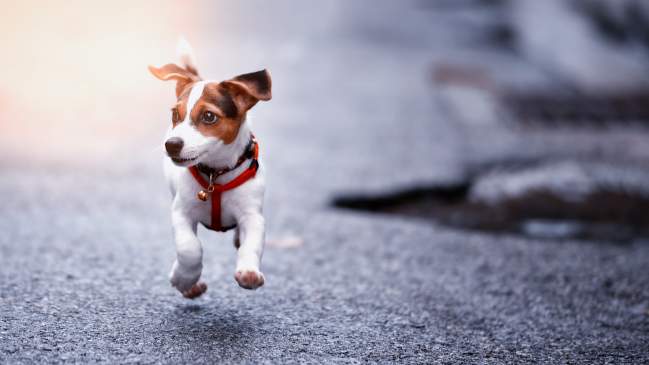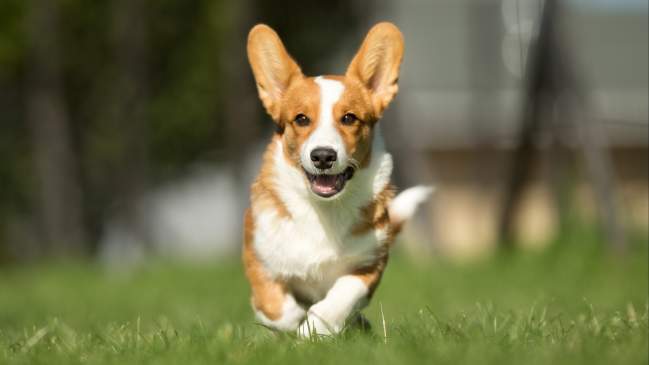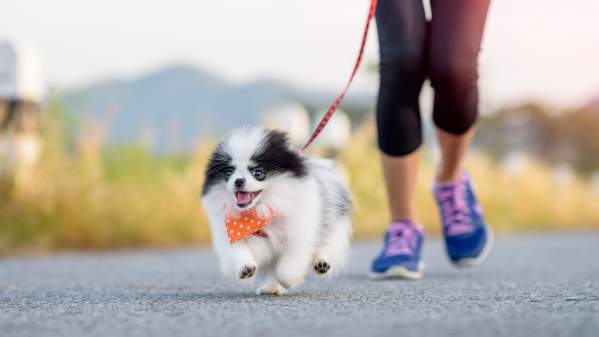For those who like to run, there's nothing like having your furry friend quick at your heels. Yet, there are those who love to run and love dogs but want something in a small breed. This might be due to having size restrictions where you live or simply that you like a smaller dog. Whatever the reason, there are small breeds that are perfect for runners.Here are some of the best small breeds for runners, as well as what breeds to avoid and all about dogs and running.
Dogs and Running
Like their human counterparts, dogs need exercise too.
According to Health:
American pets have a pudge problem: an estimated 52% of dogs are overweight or obese. Walking or running with your dog on a leash is one way to get you both moving more. Not all dogs are cut out to log multiple miles at once (more on that later), but many can learn to be great running partners. "Even if you think your dog is too hyper or too poorly behaved to jog alongside you, he may just need some training and some time to get used to it," says Angi Aramburu, owner of Go Fetch Run, a group exercise class for owners and their dogs in New York City.
The important thing is to know if your breed of dog is ideal for going on an afternoon jog or even a marathon. Some dogs are built to run and some simply don't have the right breathing tools or structure.
Dogs That Aren't Going to Be in the Olympics
There is a lot to consider when choosing a small dog breed as a running partner. Some dogs just aren't cut out for it. Even larger breeds may have issues with running. For instance, some larger dogs are prone to hip dysplasia and older dogs can have joint issues no matter what their size.
The main things to think about with a smaller breed is leg size and snout. A dog with short legs like a Dachshund or French Bulldog cannot keep up with running as well. In fact, they sometimes cannot keep up with a jogging pace due to their leg size. This puts a lot of exertion on them to try to keep up and it's just not going to happen.
As far as snouts, some dogs have what is called being a brachycephalic dog. These dogs have flat faces and short noses. If you've ever been around a Pekingese or Pug, you'll often hear them breathing hard after any exertion or even while sleeping. This makes it hard for them to participate in brisk exercise at all. This is because the airways are partially obstructed while their nostrils are more narrow than in other breeds. Think of them like a human with asthma; it is going to be more difficult to run long distances and can be detrimental to their health.
Best Small Dog Breeds for Runners
Now that you know what breeds and types of dogs may not be best for your running routine, here are some to consider that make great running partners.
Jack Russel Terrier

This little powerhouse dogs are perfect as a running partner. While they do have short legs, they can easily run a 5K as long as they are built up to it. Start out slow as with any breed and one thing to keep in mind is that these dogs are good for faster, yet shorter runs. Try keeping it under three miles.
Shetland Sheepdog
This isn't the smallest of the pack but this smaller version of a Collie is ideal for taking a jog with you. Keep your mileage semi-short because while these dogs are trained herders, athletic, and agile - they can't go for miles and miles of running.
Papillion
The Papillion is a very athletic toy breed. Keep the runs short but otherwise, this type of canine is light on its feet and has a lot of agility and energy. The AKC states that the Papillion is happy to run in the yard and chase things like squirrels. Their active level is high enough that a run with you should be just as fun and fulfilling.
Chinese Crested
These hairless fellows are an athletic choice for running. One thing to keep in mind with them is that their skin must be protected. Since there is no hair to protect them, make sure they are warm enough in the winter and have plenty of sunscreen in the summer. They sunburn just like we do.
And speaking of the heat, according to Science Daily:
All dogs are at risk for overheating. When it's hot, the heat, especially combined with humidity, makes it easier for the dog to succumb to heat exhaustion. Be especially cautious with dogs with short noses, like bulldogs and Boston terriers, because they can't cool themselves as effectively as other dogs due to the conformation of their noses. Dark-haired and long-coated dogs also are at higher risk. If during exercise your dog starts acting woozy, gets a dark red-colored tongue or gets thick ropy saliva, you should stop immediately and get it in a shaded area. Offer water and hose it down with cool water if necessary. For more severely effected dogs, wet them down with water and then take them to a veterinarian immediately.
Miniature Poodle
You might think of a poodle as a fluffy little fluff ball that requires high maintenance. Instead, a miniature poodle is pretty versatile and fairly athletic. Some even say that they're ideal for the veteran runner as well as those just starting out. And running is a good thing for your Poodle. It helps minimize aggression, destructive behavior, barking, and attention seeking behavior.
Pembroke Welsh Corgi

When thinking of a running partner, the Corgi is probably not the first thing you think of. Yet, even with its short legs and wiggly butt, the Corgi was originally bred for doing just that. In the 16th Century, a turnspit dog was used to help cook. It ran along a wheel that turned the spit. According to NPR:
What kind of dog today is the closest to a turnspit dog? Bondeson thinks possibly it's the Queen of England's favorite dog, the Welsh corgi. "The downtrodden, lumpen, proletariat turnspit cooking dogs may well be related to the queen's pampered royal pooches."
Brittany Spaniels
The Brittany Spaniel is an athletic and agile dog perfect for running because of their light-boned and leggy structure. These dogs always aim to please and have plenty of energy for a running mate. In fact, this kind of exercise is perfect for them. Just make sure you start slow like with any dog.
Miniature Pinscher
Since a Miniature Pinscher is just like its larger ancestors, it is a good choice for your running program. It still has the same athleticism. The only difference is that its size is smaller. Everything else is the same.
Whippet
The Whippet is similar to its cousin the Greyhound. And what are Greyhounds know for? Racing and running fast. Whippets are simply smaller - coming in at around 20 - 30 pounds. They are full of endurance and speed so they are perfect for taking for a run. Think of a Greyhound, just smaller.
Shetland Sheepdog
These dogs are built to herd sheep. Their structure is sturdy and strong and they are actually one of the best smaller breeds to run with due to these attributes. Keep in mind that like some other breeds, these dogs are furry. So be aware of overheating concerns.
Running With Your Dog
Here are some things to keep in mind before starting a new routine with your dog. Most of these are just to be safe but in place so that your dog is as healthy and safe as possible.
Wait a While
A puppy is not your ideal running mate because their tiny bones and joints have not developed yet. The best way to know is to ask your vet about the particular breed you have. While the puppy is growing, it doesn't matter what size of breed it is - it's a no no. Keep in mind that smaller breeds can participate usually faster than a larger breed. This is simply because it takes longer for the larger breed to grow and for the growth plates to seal.
Rome Wasn't Built in a Day
Most people cannot just run a marathon after leading a more relaxing lifestyle. This is the same for your dogs. Make sure that you introduce running to your dog slow and easy at first. Start at a healthy and easier pace. Some suggest that alternating between running and walking is good because it allows your furry friend and you to relax in between sprints.
Warm Up
Just like you warm up before exercising or running, your dog is no different. A slow jog or a fast walk is ideal before doing any running or even fast-paced jogging. Warming up works well to allow your dog to explore the area and take any bathroom breaks needed. This will allow you more time on focused running later.
Use Hiking Trails
If available where you live, hiking trails are much easier on you and your dog's joints. Asphalt is harsh and doesn't have any give to it. Not to mention that it is extremely hot in the summer and can burn your dog's precious paws. If you are using hiking trails, be aware of any wild animal warnings and always use a leash unless it is specifically an off-leash friendly area.
Don't Overdo the Food
Just like you wouldn't eat a heavy meal before a run, neither should your dog. Keep the food and treats light before and directly after a run. Tummy aches are common if food is given too soon after. What to Know Before Running There are a few things that are crucial in your decision of if your pet is a good running partner.
Age
The age of the dog is important. A dog that is too young should not be a running partner till they're older and their bones have finished growing. A dog that is elderly may not have the stamina or feel good enough for long runs.
Breed
As we mentioned some breeds above, this is imperative too. Extremely small dogs are not ideal such as the Chihuahuas. This is because they have a hard time keeping up with having their tiny little legs. On the other side, there are certain large breeds not fitted well for long distance running such as the Great Dane.
Personality
Let's face it, some dogs simply do not enjoy running. Much like you might not enjoy weight lifting or cycling, some dogs simply aren't into running. Even if they have everything else like the right age, breed, and ability - it may not be something they want to do. In fact, all dogs should be treated as an individual, even when it comes to exercise.
Health
This is extremely important. Make sure that your dog is in good health before starting an exercise program. If your dog is overweight, while running is exercise, it is a good idea for them to lose a little weight first. Another area that affects their ability to run is joints. If your dog has hip dysplasia or arthritis, running is not the ideal exercise for them.
The Most Important Thing is to Have Fun
Make sure that running with your dog is fun for the both of you. Don't push your dog too much and be aware of its needs when you're out. Exercising and being in shape with a partner is an excellent idea. Just make sure that your partner is best fitted for the task and that you are aware of its limitations.
One way to make it fun for your dog is to play search and find games or stop for play breaks. You'll know that your dog loves going for a run as much as you when you grab the leash and your dog is eager to go.
